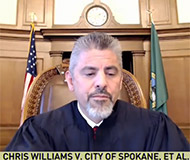6/17/2021
Washington Supreme Court Takes Up Speed Camera CaseSchool zone speed camera dispute heard in the Washington Supreme Court.

A legal challenge to the use of speed cameras in Washington is about to be resolved by the state's highest court. Attorneys for motorist Chris Williams made their case in a virtual hearing with nine justices who focused on legal technicalities related to whether Williams was able to raise the suit in the first place.
Williams insisted the city of Spokane colluded with American Traffic Solutions (ATS, now known as Verra Mobility) to issue automated citations to drivers passing through a school zone that had not been properly established. He had received a $234 ticket in the mail for driving 28 MPH on Nevada Street, blocks away from the Longfellow Elementary School on March 11, 2016. In the suit Williams filed in Spokane County Superior Court, he noted the ticketing zone was 385 feet away from the school's marked crosswalk -- 85 feet outside the statewide standard. To extend a zone beyond 300 feet, a traffic study and city ordinance is required. As no ordinance existed at the time, Williams insisted the proper speed limit for the location was 30 MPH.
The zone in question had generated at least $4 million in revenue by 2018, so the city wasted no time pressing for the lawsuit to be thrown out. The lower courts obliged. The motorist's attorney, Sara Harmon, told the justices that the Court of Appeals failed to follow proper procedures when it used an issue not raised by the city to toss the suit. The judges concluded Williams could not show he would be harmed if the school zone camera continued to operate.
"Mr. Williams had no opportunity to cure the standing issue," attorney Sara Harmon explained. "Both personal and professional reasons often took him right back through that exact same zone, and he was a person that feared that he would have a future violation of his rights in that area."
ATS/Verra Mobility lawyer Vanessa Soriano Power said Williams did not need to worry about being ticketed in the future because he said he drives the speed limit. Chief Justice Steven C. Gonzalez appeared to see how Williams would have standing based on that fact.
"Isn't the speed limit different depending on whether you're within or without the school zone?" the justice asked. "So, if the school zone enforcement goes beyond the confines of the school zone, then isn't the speed limit different? Wouldn't his argument be, 'I'm going to drive under what's the legal speed limit, but I'm being cited for driving under an inapplicable speed limit' -- isn't that enough?"
If the other justices agree that it is, the case would be sent back for a trial on the merits of whether the school zone had been properly established.


